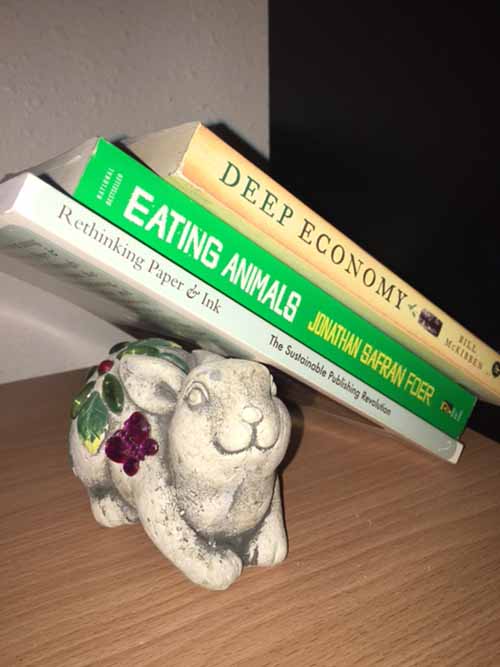April brings us spring and Earth Day, which I’ve always found fitting. Spring evokes freshness, bright colors, new life, and sunshine (if us Portlanders are lucky)—there is a heightened awareness of the earth. Although I am a proponent of every day being Earth Day, I think using holidays like this to draw attention to environmental issues makes perfect sense.
Maybe you’re not into gardening, or your allergies have you huddled inside your apartment with a bottle of Benadryl and those swanky lotion-infused tissues. Perhaps you’re interested in environmentalism but not sure where to start. Look no further! I’ve compiled a list of books covering everything: the business behind green book publishing, the food we eat, the water we drink (and eat), and the economic implications of a localized business structure. Read, be inspired, and live green. Happy Earth Day!
-
- Rethinking Paper and Ink: The Sustainable Publishing Revolution by Ooligan Press
Curious how books could possibly be considered green? Ever wondered how a book-publishing press could produce their products sustainably? This is the book for you. Even if you’re not in the publishing field, this book contains keen, valuable insight into the business world, as well as tactics and tools for creating a more sustainable and eco-friendly process and product. Carefully constructed with love and dedication by Ooligan Press, Rethinking Paper and Ink is the perfect book to read in celebration of Earth Day.
-
- Eating Animals by Jonathan Safran Foer
In this book, Foer (an off-and-on vegetarian for many years) delves into the moral implications of how he eats, what he eats, and the food systems in place that make that food available. Foer’s book is introspective and also presents a well-researched and thought-provoking look into the way we eat, as well as the environmental implications and consequences. This book is a great read for veggies and omnivores alike.
-
- Second Nature: A Gardener’s Education by Michael Pollan
Pollan has become a familiar name in environmentalist circles. I could have filled this list up with his works alone—The Omnivore’s Dilemma and The Botany of Desire are two of my favorites. Second Nature is particularly appropriate for Earth Day as it discusses our relationships with nature and encourages us to reconsider the ways in which we interact with the natural world.
-
- When the Rivers Run Dry: Water—The Defining Crisis of the Twenty-First Century by Fred Pearce
Water scarcity often falls by the wayside in discussions concerning the environment, climate change, and natural resources. Pearce brings this to the forefront in a big way in this book. A scientist himself, he travels around the world researching and examining the state of water resources—and the scary reality of the scarcity of such sources.
-
- Deep Economy: The Wealth of Communities and the Durable Future by Bill McKibben
Trying to find a book that explains the ins and outs of the business behind food in a way that won’t compel you to throw said book in a pulper can be challenging. McKibben’s book is one of the clearest and most compelling books I have read on the subject. Deep Economy argues for the localization of food markets and a more community-based system rather than the insatiable urge for growth that dominates today.

